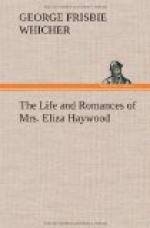of her “Fortunate Foundlings” (1744),
“Female Spectator” (1744-6), and her most
ambitious novel, “The History of Miss Betsy Thoughtless”
(1751). The productions known to be hers do not
certainly represent the entire output of her industry
during this period, for since “The Dunciad”
her writing had been almost invariably anonymous.
One or two equivocal bits of secret history and scandal-mongering
may probably be attributed to her at the very time
when in “Epistles for the Ladies” (1749-50)
she was advocating sobriety, religion, and morality.
These suspected lapses into her old habits should
serve as seasoning to the statement of the “Biographia
Dramatica” that Eliza Haywood was “in mature
age, remarkable for the most rigid and scrupulous
decorum, delicacy, and prudence, both with respect
to her conduct and conversation.” If she
was not too old a dog to learn new tricks, she at
least did not forget her old ones. Of her circumstances
during her last years little can be discovered.
“The Female Spectator,” in emulation of
its famous model, commences with a pen-portrait of
the writer, which though not intended as an accurate
picture, certainly contains no flattering lines.
It shows the essayist both conscious of the faults
of her youth and willing to make capital out of them.
“As a Proof of my Sincerity, I shall, in the first place, assure him [the reader], that for my own Part I never was a Beauty, and am now very far from being young; (a Confession he will find few of my Sex ready to make): I shall also acknowledge that I have run through as many Scenes of Vanity and Folly as the greatest Coquet of them all.— Dress, Equipage, and Flattery were the Idols of my Heart.—I should have thought that Day lost, which did not present me with some new Opportunity of shewing myself.—My Life, for some Years, was a continued Round of what I then called Pleasure, and my whole Time engross’d by a Hurry of promiscuous Diversions.—But whatever Inconveniences such a manner of Conduct has brought upon myself, I have this Consolation, to think that the Publick may reap some Benefit from it:—The Company I kept was not, indeed, always so well chosen as it ought to have been, for the sake of my own Interest or Reputation; but then it was general, and by Consequence furnished me, not only with the Knowledge of many Occurrences, which otherwise I had been ignorant of, but also enabled me ...to see into the most secret Springs which gave rise to the Actions I had either heard, or been Witness of—to judge of the various Passions of the Human Mind, and distinguish those imperceptible Degrees by which they become Masters of the Heart, and attain the Dominion over Reason....
“With this Experience, added to a Genius tolerably extensive, and an Education more liberal than is ordinarily allowed to Persons of my Sex, I flatter’d myself that it might be in my Power to be in some measure both useful and entertaining to the Publick.”
A less favorable glimpse of the authoress and her activities is afforded by a notice of a questionable publication called “A Letter from H—– G—– g, Esq.” (1750), and dealing with the movements of the Young Chevalier. It was promptly laid to her door by the “Monthly Review."[32]




